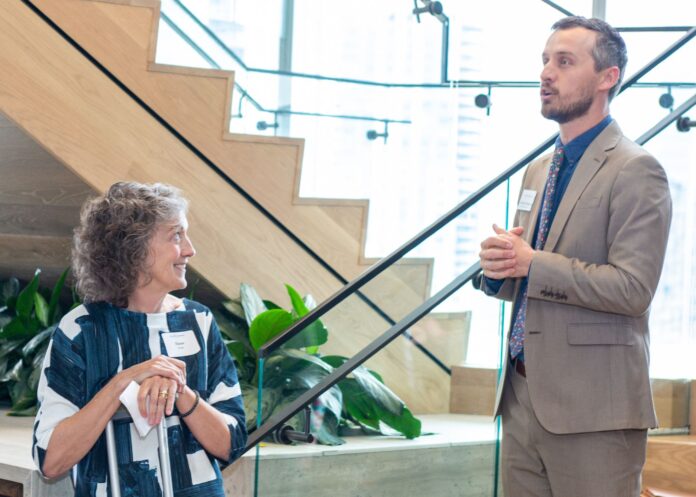
It’s been close to a year since Jordan Bates-Rogers took the reins as executive director of the Legal Aid Foundation of Colorado and the Colorado Lawyer Trust Account Foundation following the retirement of its longtime executive director Diana Poole in 2023.
Poole served as the organizations’ executive director for nearly two decades. While she’s now retired, Bates-Rogers said that she’s been a great resource and supportive throughout the transition.
Bates-Rogers came to Colorado by way of Arkansas, where he served as the executive director for Arkansas Access to Justice, another legal aid foundation, for three years.
He told Law Week that he lived in Arkansas for his entire life, except for a stint in Alabama during his time at the University of Alabama Law School. He said his time in law school was where he got his desire to work in public interest law.
“I did an elder law clinic and got to see how something as easy and simple as a will would bring a client to tears of gratitude, and that really just hit me in the heart,” Bates-Rogers said.
Following law school, he moved back to Arkansas, where he worked in the Mississippi Delta region of the state. According to the Delta Regional Authority, the seven-state Delta region “suffers from a greater proportion of measurable poverty and unemployment than any other region in the United States.”

“I really got to see, again and again, that legal aid made such a big difference,” Bates-Rogers said. “That was mostly housing work. It’s one of the most important parts of your life, being able to provide a roof over your head for yourself and your kids, and when that’s threatened, it sort of puts everything in your life into jeopardy and shambles when you lose that housing.”
He heard of Poole’s retirement through the Interest on Lawyers Trust Accounts community, and he said that he and his husband had been looking at Colorado for a while as a place to live.
“It felt like the universe was speaking and saying it was time to apply and see how things worked out,” Bates-Rogers said.
Upon his arrival to the state, he saw a lot of positives in the legal aid community.
“On the funding side, the firms in Colorado have an ethic of supporting legal aid, it’s really a deeply rooted value for a lot of the law firms here,” Bates-Rogers said. “That is the firm itself giving, its members giving, its associates — I think that was one of the most impressive things coming from the outside, was how hard the associates work.”
He noted the leadership and the driving force the associates had in LAF’s annual associate fundraising campaign, and the impressive amount of money they’re able to raise at the beginning of their careers.
“It was several legal aid salaries that they funded for a year with their one-month fundraising campaign,” Bates-Rogers said.
On the COLTAF side, the high interest rates have been a boon, as it has allowed the organization to expand its number of grantees.
One challenge he’s encountered in Colorado has been the number of legal aid providers in the state. In Arkansas, he noted that there were only three or four legal aid providers in the entire state. But in Colorado, there are both general legal aid providers and several that focus on specific issues.
“I think the challenge that creates is, we have to be very conscientious about talking to each other and collaborating and understanding — you know, ‘I can’t help this person right now, we just have assigned too many cases to our staff members, so what’s the next best program for me to refer them to?’” Bates-Rogers said.
“That sort of coordination and coordinated intake and referral is probably the biggest challenge that Colorado faces, which is a product of the blessing of so many legal aid programs,” Bates-Rogers added.
To help with that, COLTAF awarded a grant this summer to the Colorado Access to Justice Commission to both revive a library-based legal clinic and to create a statewide pro bono coordination position, housed at CAJC.
Another goal of his, and one he thinks is the most important, is telling the story of legal aid in a particular way.
“I worked as a legal aid lawyer, but I feel really strongly that legal aid is not about lawyers, it’s not about courtrooms, it’s not about cases and it’s not about pleadings. It’s about people,” Bates-Rogers said. “And I think that’s an opportunity that we have, is to really tell the story of legal aid from as close as we can get to the perspective of the person whose life is changed by legal aid.”
Rather than tell a story about a lawyer fighting in a courtroom for justice, he wants the focus to be on the people who need legal aid.
“We all care about people being safe, getting health care, getting education, and that’s what legal aid is about, not about lawsuits,” he added.

